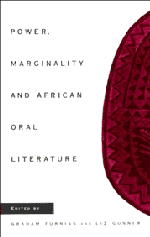Book contents
- Frontmatter
- Contents
- List of contributors
- Preface
- Note on transcription
- 1 Introduction: power, marginality and oral literature
- Part I Orality and the power of the state
- Part II Representing power relations
- Part III Oral forms and the dynamics of power
- Part IV Endorsing or subverting the paradigms: women and oral forms
- Part V Mediators and communicative strategies
- 15 Power and the circuit of formal talk
- 16 Praise splits the subject of speech: constructions of kingship in the Manden and Borgu
- 17 Beyond the communal warmth: the poet as loner in Ewe oral tradition
- Bibliography
- Index
15 - Power and the circuit of formal talk
Published online by Cambridge University Press: 18 December 2009
- Frontmatter
- Contents
- List of contributors
- Preface
- Note on transcription
- 1 Introduction: power, marginality and oral literature
- Part I Orality and the power of the state
- Part II Representing power relations
- Part III Oral forms and the dynamics of power
- Part IV Endorsing or subverting the paradigms: women and oral forms
- Part V Mediators and communicative strategies
- 15 Power and the circuit of formal talk
- 16 Praise splits the subject of speech: constructions of kingship in the Manden and Borgu
- 17 Beyond the communal warmth: the poet as loner in Ewe oral tradition
- Bibliography
- Index
Summary
Scholars have time and again emphasised the rhetorical power of verbal art, its potential as a source of power and knowledge (Abrahams 1972). The very enactment of verbal art is, indeed, an attention ploy, foregrounding the persona of the performer and giving him or her access to certain privileges and power over an audience. Thus for as long as he or she performs, the performer can be said to have assumed an authoritative role: he or she is a potential source of power.
But if verbal art is a source of power, the converse cannot be ruled out: power as a source of verbal art, or rather power as a controlling force influencing the form and content of verbal art. In this domain, one could subsume all verbal art forms enacted in the service of power play, or consciously cultivated to depict, project and enhance personal charisma. It is, perhaps, in the exercise of royal power that this is best exemplified:
At the political center of any complexly organized society, there is both a governing elite and a set of symbolic forms expressing the fact that it is in truth governing. No matter how democratically the members of the elite are chosen or how deeply divided among themselves they may be, they justify their existence and order their actions in terms of a collection of stories, ceremonies, insignia, formalities and appurtenances that they have either inherited or, in more revolutionary situations invented.[...]
- Type
- Chapter
- Information
- Power, Marginality and African Oral Literature , pp. 211 - 224Publisher: Cambridge University PressPrint publication year: 1995
- 4
- Cited by



